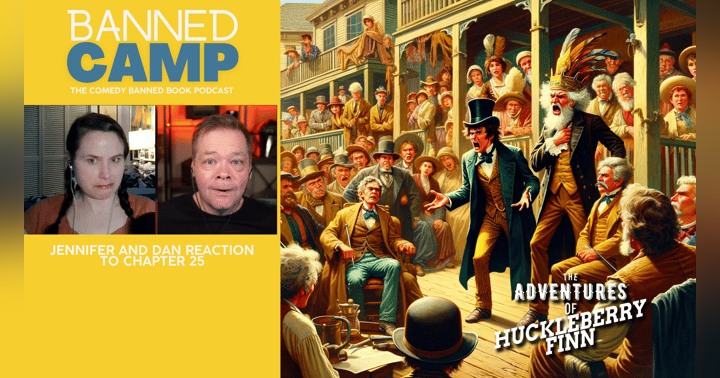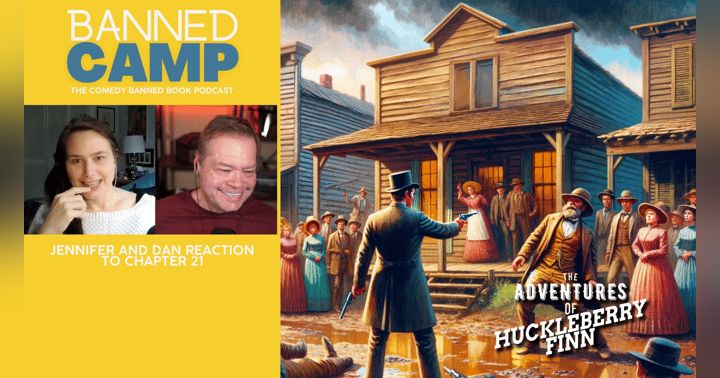Chapter 3 Analysis: Bonds and Brotherhood in 'The Outsiders'

In a recent episode of "Banned Camp," the irreverent podcast that's taking a humorous stand against book banning, Jennifer and Dan delved into the intriguing depths of Chapter 3 of S.E. Hinton's "The Outsiders." If you're intrigued by banned books, literature, and engaging discussions with a dash of wit, you've come to the right place.
Banned Camp, hosted by the dynamic duo of Dan and Jennifer, offers a refreshingly unique take on the world of literature. It's not your ordinary book club; it's a comedic journey into the heart of banned books, complete with spontaneous banter and insightful analysis. Join the discussion in this episode as they dissect Chapter 3 of "The Outsiders," uncovering hidden gems and sparking conversations that go beyond the pages.
But what sets Banned Camp apart isn't just its hilarious banter – it's the unapologetic stance it takes in the face of book banning, a topic that's unfortunately gaining traction in today's world. With a liberal and progressive perspective, the podcast dares to challenge the ban-wagon, making a compelling case for intellectual freedom.
In this article, we'll embark on an extended exploration of Chapter 3 of "The Outsiders," delving into its themes, character development, and the thought-provoking questions it raises. We'll also examine how this chapter fits into the broader narrative of S.E. Hinton's timeless classic and why certain elements might have raised eyebrows in the context of book banning. So, if you're ready to journey through the forbidden pages of literature with a side of laughter, let's dive into the world of "Banned Camp."
What Is In Chapter 3 Of "The Outsiders"?
Before we dive headfirst into the delightful chaos of Chapter 3 of "The Outsiders," let's take a moment to catch up on all the Banned Camp episodes surrounding this riveting book. You can find them in the Banned Camp archives, where each episode unravels a new layer of this classic tale.
In Chapter 3, the gang from the East Side of town continues their eventful night after a movie screening. The group decides to pay a visit to Two-Bit's house to fetch his car, which will be their ticket to escorting the girls home. This chapter is not just about logistics, though; it's a glimpse into the intricate dynamics between characters and the underlying themes of the story.
Character Development
In Chapter 3 of "The Outsiders," the characters take center stage, and their growth and interactions provide us with a deeper understanding of their personalities and the world they inhabit.
Two-Bit and Marcia's blossoming connection is a notable development. Their chemistry and ability to get along despite the tension surrounding them hint at the possibility of bridging the gap between the Greasers and the Socs. It's a ray of hope in a world often divided by class and social status.
However, the real character exploration happens between Ponyboy and Cherry. As they walk and talk, they reveal their innermost thoughts and vulnerabilities to each other. Cherry's insights into the core differences between the two gangs, emphasizing not just economic disparities but emotional detachment, offer a fresh perspective.
Ponyboy, our teenage narrator, experiences a profound revelation. Despite the apparent rivalry and animosity, he recognizes a "basic sameness" between the Greasers and the Socs. What sets them apart is not their financial status, but the intensity of their emotional responses to life. Ponyboy's candor in acknowledging these similarities showcases his growing maturity and empathy.
However, just when it seems like this chapter will be defined by introspection and camaraderie, the arrival of the blue Mustang disrupts the peace. The tense encounter with Randy and Bob, the Socs who had previously clashed with Johnny, serves as a stark reminder of the persistent divide in their society.
The character dynamics in Chapter 3 of "The Outsiders" are like pieces of a puzzle coming together, revealing a more complex picture of these teenagers' lives. As we progress through the story, we'll witness their growth, challenges, and the impact of their choices on their individual destinies. Stay tuned for more character revelations and gripping narratives in the world of "Banned Camp."
Two-Bit and Marcia's budding connection is a highlight, providing a sprinkle of hope amidst the tension that often defines the social divisions in this world. As they stroll along, our protagonist, Ponyboy, and the enigmatic Cherry find themselves sharing intimate insights. Cherry unveils her perspective on what sets the Greasers and the Socs apart, and it goes beyond just money—it's about passion, or rather, the lack thereof.
What's fascinating here is how Ponyboy, our Greaser hero, begins to see the commonalities between the two rival gangs. Despite the apparent differences, he recognizes a "basic sameness." However, it's their emotional responses to life that truly set them apart. In Ponyboy's words, "It's not money, it's feeling—you don't feel anything, and we feel too violently."
But just when things seem to be settling into a thoughtful conversation, a blue Mustang rolls up, and tensions rise. The Mustang belongs to none other than the Soc boys, Randy and Bob, the very same individuals who had recently crossed paths with Ponyboy's friend, Johnny, in a less-than-amicable manner.
As you can imagine, things get a tad intense, and the potential for a fight looms. However, Cherry, with her level head and wisdom, manages to defuse the situation, ultimately leading the girls back to the blue Mustang, leaving behind a group of perplexed Greasers.
But that's not all this chapter has to offer. It's a rollercoaster of emotions and revelations. As we continue our journey through "The Outsiders," we'll uncover even more layers of this compelling story and the thought-provoking questions it raises. And who knows, we might even stumble upon a comedic gem from the episode that's worth a chuckle or two. Stay tuned!
Themes and Symbols
Chapter 3 of "The Outsiders" delves into several poignant themes and employs symbols that enhance the depth of the narrative:
1. Social Divisions and Common Humanity
The most prominent theme in this chapter is the stark division between the Greasers and the Socs. Cherry's insightful observation that the difference between the two gangs extends beyond mere economics, delving into emotional detachment, sheds light on the underlying issue of social divisions. While the Greasers and Socs may seem worlds apart, they share a fundamental sameness as teenagers navigating the challenges of growing up.
2. Passion vs. Detachment
Cherry's distinction between the two groups highlights the theme of passion versus emotional detachment. The Socs, often portrayed as cool and unfeeling, appear to lack the intensity of emotion that characterizes the Greasers. This theme raises questions about the impact of emotions on individual choices and relationships.
3. Identity and Self-Perception
Ponyboy's character development is intrinsically tied to his sense of identity and self-perception. His growing awareness of the commonalities between the Greasers and Socs challenges his preconceived notions about the world. This theme invites readers to consider how our self-perception can evolve when confronted with new perspectives.
4. The Car as a Symbol
The blue Mustang, owned by the Socs, serves as a powerful symbol in this chapter. It represents the external manifestation of the social divide and the looming threat that the Greasers face from the Socs. The Mustang's appearance creates tension and reinforces the boundaries between the two groups.
Chapter 3 of "The Outsiders" masterfully weaves these themes and symbols into the narrative, prompting readers to reflect on the complexities of society, human emotions, and the fluid nature of identity. As we journey further into this classic novel with "Banned Camp," we can anticipate a deeper exploration of these themes and their significance in the larger story.
Chapter's Impact on the Overall Story
While Chapter 3 of "The Outsiders" may appear to be a relatively tranquil interlude in the lives of its characters, it carries significant implications for the broader narrative. This seemingly ordinary night out sets the stage for pivotal developments and underscores the enduring tensions that permeate the world of the Greasers and Socs.
1. Character Bonds and Alliances
The interactions in this chapter foster essential bonds among the characters. Two-Bit and Marcia's budding relationship hints at the possibility of reconciliation between the two rival groups, offering a glimmer of hope for unity. Ponyboy's candid conversations with Cherry reveal shared experiences and emotions that transcend social boundaries. These newfound alliances plant the seeds for future collaborations and challenges.
2. Foreshadowing Conflict
The appearance of the blue Mustang, associated with the Socs Randy and Bob, foreshadows impending conflict. This chapter serves as a reminder that the divisions between the Greasers and Socs are far from resolved. The encounter with the Socs not only adds suspense but also sets the stage for future confrontations and choices that will shape the characters' destinies.
3. Character Growth and Self-Discovery
Chapter 3 initiates character growth, particularly for Ponyboy. His willingness to challenge his preconceived notions and his ability to empathize with Cherry's perspective mark the beginning of a transformative journey. Ponyboy's evolving self-awareness hints at a deeper exploration of identity and personal growth as the story progresses.
In the grander scheme of "The Outsiders," Chapter 3 serves as a crucial building block. It introduces key themes, strengthens character bonds, and foreshadows the challenges that lie ahead. As we continue to unravel the layers of this timeless tale with "Banned Camp," we can anticipate how these initial threads will weave into the fabric of a gripping and thought-provoking narrative.
Banning Triggers: Themes from this Chapter
In the world of book banning, where words are often scrutinized for their content and influence, Chapter 3 of "The Outsiders" does not escape the radar of those who seek to restrict literature. While it may seem like an innocuous chapter, it touches upon themes and elements that have, at times, raised concerns among those advocating for censorship.
1. Social Realism and Unfiltered Dialogue
One aspect that might raise eyebrows among certain circles is the book's commitment to social realism. S.E. Hinton's portrayal of the social divide, the raw dialogue between characters, and the unfiltered depiction of teenage life can be seen as both powerful and controversial. Some might argue that it's too explicit or gritty for young readers, potentially sparking discussions about the appropriateness of such content.
2. Challenging Social Norms
Chapter 3 delves into the theme of challenging social norms and preconceived notions. Ponyboy's willingness to engage with Cherry and his ability to see beyond the surface differences between the Greasers and Socs may be perceived as a threat by those who prefer a more polarized view of society. This chapter encourages readers to question stereotypes and divisions, which can be unsettling to some.
3. Teenage Rebellion and Independence
Teenagers asserting their independence and rebelling against authority figures are recurring themes in "The Outsiders." While these themes resonate with many young readers, they may be viewed skeptically by adults who worry about the influence of such narratives on impressionable minds. Chapter 3 hints at Ponyboy's growing independence and his willingness to question the status quo, a trait that might be considered provocative.
Despite these potential "banning triggers," it's crucial to remember that "The Outsiders" has been a staple in many school curricula, sparking important conversations about empathy, social justice, and the complexities of teenage life. As we navigate the themes of this chapter with "Banned Camp," we not only uncover the nuances of literature but also examine the very nature of censorship and its implications for intellectual freedom.
Banned Camp, is a comedy podcast where we read banned books and find out why they were banned in the first place. Dive into our banned book podcast to explore more.










